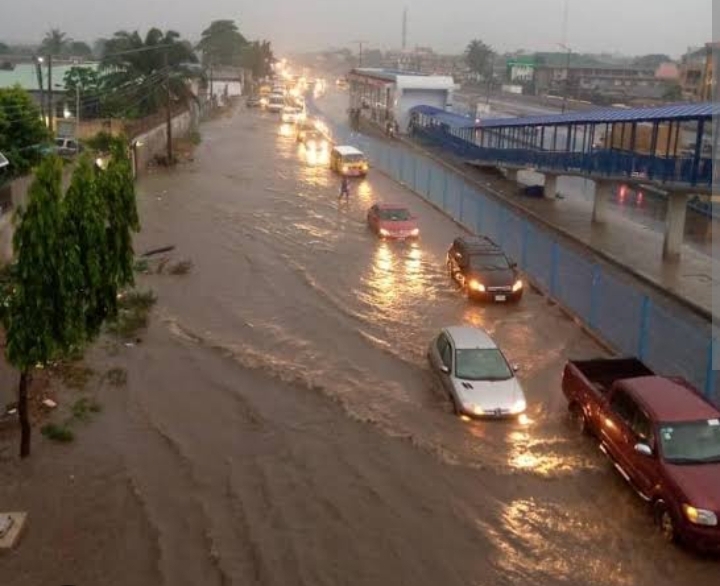Residents and motorists in Lagos were on Monday caught in traffic chaos and devastating floods following a torrential rainfall that began around midnight and persisted into the morning hours. The downpour triggered flash floods across the metropolis, submerging roads, stranding commuters, and overwhelming several homes and businesses.
The Nigerian Meteorological Agency (NiMet) had earlier warned of thunderstorms and heavy rainfall from Monday through Wednesday, predicting flash floods in various parts of the country. In its forecast released on Sunday, NiMet specifically mentioned Lagos, among other states, as a high-risk zone for flooding during the period.
The agency had cautioned residents to avoid traveling under heavy rainfall and urged authorities in flood-prone states to activate emergency response systems. It also advised the public to secure loose objects, disconnect electrical appliances, and stay informed via NiMet’s official platforms.
City in Gridlock
Despite the warnings, early Monday saw many Lagos roads—including the Lagos-Abeokuta Expressway, Ikorodu Road, Apapa, Alimosho, Lekki, Agege, Oworonshoki, Ikotun, and the Long Bridge along the Lagos-Ibadan Expressway—completely flooded. The situation resulted in massive traffic congestion as motorists waded through submerged highways, with some vehicles breaking down in the process.
“It was a nightmare trying to get through Odo Iya Alaro Bridge around 5am,” said a motorist, Alhaji Abu. “The road was completely flooded, and people were just guessing their way through.”
Another commuter, John, recounted how drivers had to proceed cautiously through Alakuko on the Lagos-Abeokuta Motorway. “The flood covered all the potholes, so you couldn’t tell how deep they were,” he said.
Homes Inundated
In residential areas like Gberigbe, Ikorodu, floodwaters invaded homes, forcing residents to bail out water for hours. Many commuters were seen stranded at bus stops long after the rain had stopped, waiting for the water levels to recede.
Residents have decried the recurring flooding, saying repeated appeals to the government have not yielded visible solutions. Modupe Akinbiyi, a Gberigbe resident, said, “Every rainy season, we go through this. We’ve sent several complaints to the Ministry of Environment, but nothing has changed.”
Anthony Azubuike, a resident of Lagos Island, criticized the drainage management system. “Refuse removed from drains is just dumped beside the gutters and eventually finds its way back, blocking the channels again,” he lamented.
Government’s Response
In response, the Lagos State Government, through the Ministry of Environment and Water Resources, reassured the public that the flooding would recede and urged residents not to panic. Commissioner Tokunbo Wahab, speaking during the presentation of the 2025 Seasonal Climate Predictions (SCP), said the state has adopted a proactive flood management strategy.
Wahab advised residents of flood-prone, low-lying areas to consider relocating to safer ground when necessary. He added that the state has deployed weather and river monitoring systems, enhanced drainage maintenance, and reinforced its partnership with the Ogun-Oshun River Basin Development Authority to manage water releases from Oyan Dam.
The commissioner also warned against erecting structures on drainage channels and indiscriminate refuse disposal, stressing that these practices contribute significantly to flash flooding.
“We urge Lagosians to understand that flash floods are sometimes a natural occurrence in coastal cities,” Wahab said. “These floods usually recede a few hours after rainfall. Only when floodwaters persist for extended periods can an area be declared truly flooded.”
He noted that high tidal movements can block drainage discharge points, causing temporary backflow and flash flooding. “But once the lagoon level drops, the water clears quickly,” he added.
Call for Vigilance
The state reiterated the importance of personal responsibility in combating urban flooding and called on residents to avoid creating conditions that worsen the problem.
As cleanup continues across affected areas, the Lagos State Government maintains that it remains committed to reducing the city’s vulnerability to seasonal floods through infrastructure improvements and public awareness campaigns. /Additional report by Vanguard

